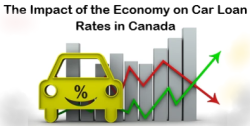 The Impact of the Economy on Car Loan Rates in Canada
The Impact of the Economy on Car Loan Rates in Canada
Understanding the relationship between the economy and car loan rates is crucial for consumers and lenders alike. The economy plays a significant role in determining interest rates on car loans in Canada, as various economic indicators and factors can influence borrowing costs. In this article, we will delve into how the economy impacts car loan rates and what factors contribute to fluctuations in interest rates.
The Impact of the Economy on Car Loan Rates in Canada
Factors Affecting Car Loan Rates in Canada
Several factors can influence car loan rates in Canada, including the Bank of Canada’s key interest rate, inflation rates, unemployment rates, and global economic trends. Lenders also consider individual credit scores, loan terms, and the type of vehicle financed when determining interest rates for car loans.
Economic Variables and Their Impact on Interest Rates
Economic indicators such as GDP growth, inflation rates, and unemployment rates affect the interest rates for car loans. Positive economic indicators, such as GDP growth and low unemployment rates, are typically associated with higher interest rates, while negative economic indicators can lead to lower interest rates.
How GDP Growth Affects Car Loan Rates
GDP growth is a vital indicator of economic health and can influence car loan rates in Canada. Strong GDP growth often leads to higher interest rates as lenders seek to capitalize on a growing economy. Conversely, weak GDP growth can result in lower interest rates to stimulate borrowing and spending.
Unemployment Rates and its Influence on Car Loan Rates
Unemployment rates can also impact car loan rates in Canada. High unemployment rates may lead to lower interest rates as lenders encourage borrowing and spending to stimulate the economy. Conversely, low unemployment rates can lead to higher interest rates to curb inflation and maintain economic stability.
Inflation and Car Loan Rates: The Connection
Inflation rates play a crucial role in determining interest rates for car loans. High inflation rates can lead to higher interest rates. To combat price increases while maintaining the currency’s purchasing power. Conversely, low inflation rates may result in lower interest rates to encourage borrowing and investment.
Bank of Canada’s Role in Setting Interest Rates
The Bank of Canada plays a significant role in setting interest rates in Canada, including the key overnight lending rate. Changes in the Bank of Canada’s key interest rate can impact car loan rates, as lenders adjust their rates in response to changes in the central bank’s monetary policy.
Global Economic Trends and Car Loan Rates in Canada
Global economic trends, such as changes in international trade policies, exchange rates, and geopolitical events, can also influence car loan rates in Canada. Uncertainty in global markets can lead to fluctuations in interest rates as lenders respond to changing economic conditions.
Impact of Exchange Rates on Car Loan Rates
Exchange rates can impact car loan rates in Canada, especially for vehicles imported from other countries. Fluctuations in exchange rates can affect the cost of imported vehicles, which may influence borrowing costs for consumers financing these vehicles through car loans.
Government Policies and Car Loan Rates
Government policies such as regulations on lending practices and tax incentives for consumers can also influence car loan rates in Canada. Changes in government policies can impact borrowing costs for consumers. Lenders adjust their rates to comply with new regulations or take advantage of incentives.
Consumer Confidence and its Effect on Car Loan Rates
Consumer confidence plays a significant role in determining interest rates for car loans in Canada. High consumer confidence can lead to higher interest rates as lenders anticipate increased borrowing and spending. Conversely, low consumer confidence may result in lower interest rates to stimulate economic activity.
Forecasting Car Loan Rates Based on Economic Outlook
Forecasting car loan rates in Canada requires a thorough analysis of economic indicators, global economic trends, and government policies. By monitoring vital economic indicators and trends, lenders and consumers can make informed decisions about borrowing and financing options based on the current economic outlook.
Final Thoughts
In conclusion, the economy has a profound impact on car loan rates in Canada with various factors influencing borrowing costs for consumers. By understanding how economic indicators, government policies, and global economic trends affect interest rates, consumers can better navigate the car financing market and make informed decisions about borrowing and financing options. Keep an eye on the economic outlook and upcoming trends to stay ahead of changes in car loan rates and make the most of your financing options.
Are you looking for an auto loan with great interest rates?
If you are in and around Toronto and are looking for an auto loan with great interest rates, we can help. At Toronto Auto Loans, we can get you an auto loan with competitive interest rates and terms. Regardless of your credit rating, you can get approved. Apply here. And have a wonderful experience. Whatever type of vehicle you want to finance, we can help you get it, so you have nothing to worry about. You can browse our inventory here anytime you like. If you want more information about our offers, call us at 1-855-227-1669.
